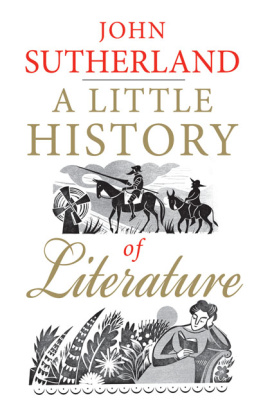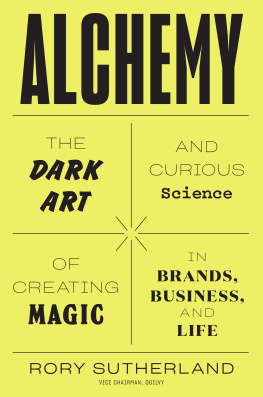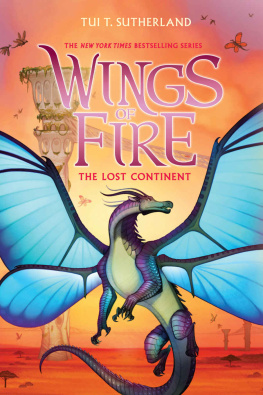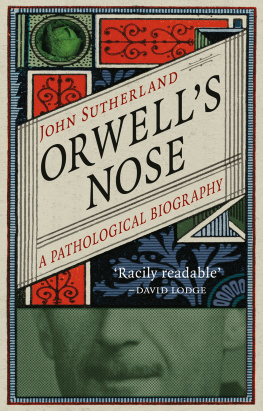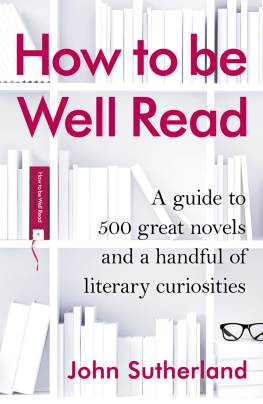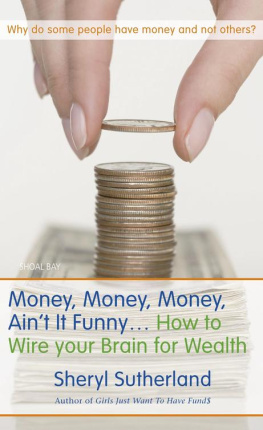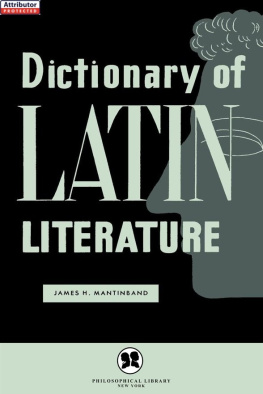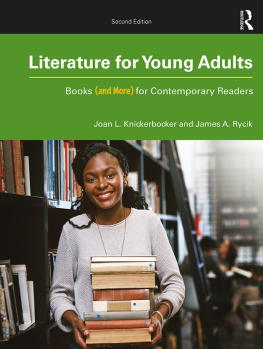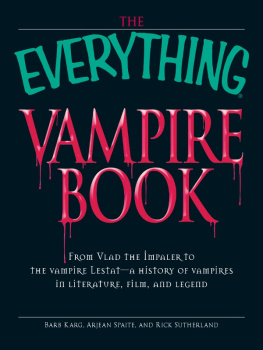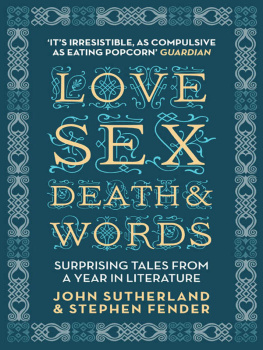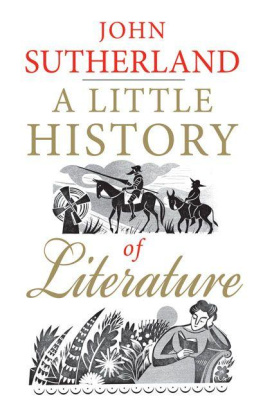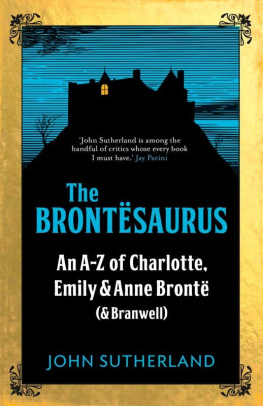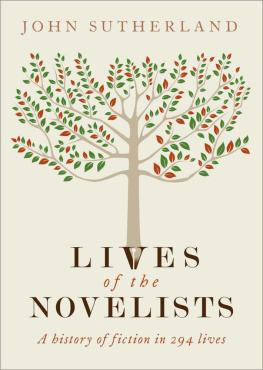

Lines from The Waste Land by T.S. Eliot, from Collected Poems Estate of T.S. Eliot and reprinted by permission of Faber & Faber Ltd. Three lines from Lady Lazarus by Sylvia Plath, from Ariel; copyright 1963 by Ted Hughes, reprinted by permission of HarperCollins Publishers. Lines from Waking in the Blue by Robert Lowell, from Collected Poems; copyright 2003 by Harriet Lowell and Sheridan Lowell, reprinted by permission of Farrar, Straus and Giroux, LLC.
Illustrations by Sarah Young
Copyright 2013 by John Sutherland
All rights reserved. This book may not be reproduced in whole or in part, in any form (beyond that copying permitted by Sections 107 and 108 of the U.S. Copyright Law and except by reviewers for the public press), without written permission from the publishers.
For information about this and other Yale University Press publications please contact:
U.S. Office:
Europe Office:
Set in Minion by Yale University Press
Printed in Great Britain by TJ International Ltd, Padstow, Cornwall
Library of Congress Cataloging-in-Publication Data
Sutherland, John, 1938
A little history of literature / John Sutherland.
pages cm
Includes bibliographical references and index.
ISBN 978-0-300-18685-7 (alk. paper)
1. LiteratureHistory and criticism. I. Title.
PN511.S746 2013
809dc23
2013024200
A catalogue record for this book is available from the British Library
10 9 8 7 6 5 4 3 2 1
Contents
M YTH
E PIC
T RAGEDY
C HAUCER
T HE M YSTERY P lays
S HAKESPEARE
T HE K ING J AMES B IBLE
T HE M ETAPHYSICALS
M ILTON AND S PENSER
P RINTING , P UBLISHING AND C OPYRIGHT
D EFOE , S WIFT AND THE R ISE OF THE N OVEL
D R J OHNSON
A USTEN
T HE C HANGING R EADING P UBLIC
D ICKENS
T HE B RONTS
L ITERATURE AND C HILDREN
W ILDE , B AUDELAIRE , P ROUST AND W HITMAN
T ENNYSON
A MERICA AND THE A MERICAN V OICE
H ARDY
L ITERATURE AND THE C ENSOR
K IPLING , C ONRAD AND F ORSTER
T HE W AR P OETS
1922 AND THE M ODERNISTS
W OOLF
U TOPIAS AND D YSTOPIAS
C OMPLEX N ARRATIVES
L ITERATURE ON F ILM , TV AND THE S TAGE
K AFKA , C AMUS , B ECKETT AND P INTER
L OWELL , P LATH , L ARKIN AND H UGHES
L ITERATURE AND R ACE
B ORGES , G RASS , R USHDIE AND M RQUEZ
L ITERATURE W ITHOUT B ORDERS
B ESTSELLERS AND P OTBOILERS
P RIZES , F ESTIVALS AND R EADING G ROUPS
CHAPTER 1

What is Literature?
Imagine that, like Robinson Crusoe, you are marooned for the rest of your days on a desert island. What one book would you most want to have with you? That is a question asked on one of the longest-running and most-loved programmes on BBC radio, Desert Island Discs. Broadcast also on the BBC's World Service, it is listened to across the globe.
The question is one of two that are put to that week's guest, after we have heard snatches of the eight pieces of music they would take to the island. The castaway is allowed one luxury what will it be? Answers are usually very ingenious: at least a couple of guests have chosen cyanide pills, for instance, and another chose the Metropolitan Museum of Art in New York. Then they are asked which book they would like, in addition to the Bible (or any other equivalent religious volume) and the works of Shakespeare, which are already on the island presumably left by the previous occupant, who chose the pill.
I've listened to the programme for fifty years now (it's been running since 1942) and much more often than not, the guest chooses a great work of literature to keep them company for the rest of their lonely lives. In recent years, Jane Austen, interestingly, has been the most popular author (more of her, and of Robinson Crusoe, later). And on virtually every one of the thousands of programmes aired, the chosen book has been a work of literature that the castaway has already read.
This points to some important truths about literature. First, obviously, that we regard it as one of the most important things in our lives. Secondly, that although we're said to consume literature, unlike the food on our dinner plate it is still there after we have consumed it. And, in most cases, it's just as appetising as it was the first time round. My own choice, when on the programme some years ago, was a novel, Thackeray's Vanity Fair, which (since I'd spent years editing and writing about it) I must have read at least a hundred times. Yet still, like my favourite music, it gives me pleasure whenever I revisit it.
Re-reading is one of the great pleasures that literature offers us. The great works of literature are inexhaustible that is one of the things that makes them great. However often you go back to them, they will always have something new to offer.
What you are holding is, as the title says, a little history, but literature is not a little thing. There is hugely more of it than any of us will read in a lifetime. At best what we can put together is an intelligent sample, and the most important decision to make is how to assemble our selection. This little history is not a manual (Read this!) but advice, along the lines of, You may find this valuable, because many others have, but, at the end of the day, you must decide for yourself.
For most thoughtful people, literature will play a big part in their lives. We learn a lot of things at home, at school, from friends, and from the mouths of people wiser and cleverer than ourselves. But many of the most valuable things we know come from the literature we have read. If we read well, we find ourselves in a conversational relationship with the most creative minds of our own time and of the past. Time spent reading literature is always time well spent. Let no one tell you otherwise.
What, then, is literature? It's a tricky question. The most satisfactory answer is found by looking at literature itself; most conveniently at the very first printed works we come into contact with over the course of our lives Children's Literature (written, one should note, for children, not by them). Most of us take those first faltering steps into the world of reading in the bedroom. (We learn to write, most of us, in the classroom.) Someone we love reads to us, or with us, in bed. So begins the lifelong journey through all those pages that lie ahead.
As we grow up, the practice of reading for pleasure which typically means reading literature stays with us. Many of us will go through life taking a novel to bed with us. (Or we may listen to Book at Bedtime, another long-running BBC radio programme.) How many of us, in our youngest days, will have naughtily gone on reading by torchlight under the bedclothes in our pyjamas? The garments (our armour, in a sense) which we put on to face the outside world the real world are more often than not tucked away across the bedroom inside a wardrobe.
Thanks to the numerous TV, film and stage adaptations of the book, many children and adults know the story of the four young Pevensies who find themselves evacuated to a house in the country. It is wartime in 1940s Britain. Under the care of kindly Professor Kirke (the word kirk means church in the Scots language: literature is always bringing in these little symbolic elements), they are safe from the nighttime raids of the London Blitz. The real world has become very dangerous for children; mysterious aircraft, for reasons not fully understood, are trying to kill people. Explaining to young children the politics, or the history, or the point of it all would be difficult. Literature, with its ability to communicate to all ages, can help.
Next page
